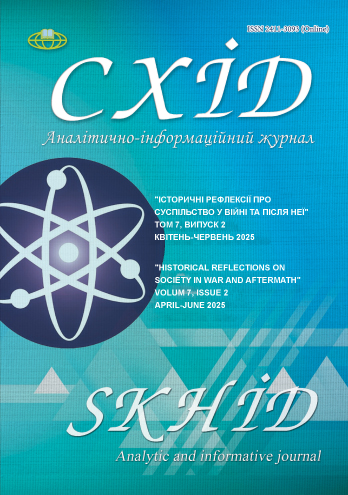From National Guilt to Constitutional Patriotism: Jürgen Habermas's Reflections on Post-War Societal Identity
DOI:
https://doi.org/10.21847/2411-3093.2025.7210Keywords:
communication, social institute of history, social transformation, historical memory, dialogue, deliberative democracy, identityAbstract
This article deals with the conceptualization of J. Habermas's discourse on historical memory and post-war societal identity. Analysis covers his criticism of Marxism as a tool of "essentialization of history" and social reductionism that devalues identities. It is substantiated that Habermas engages in active public communication directed against the traditional vision of the social institution of history, particularly against German historians who question the uniqueness of the Holocaust and the guilt of the German community. The author focuses on how Habermas, appealing to collective intelligence and rationality, rejects the reproduction of collective memory tied exclusively to conventional German identity. Analysis also covers the theoretical distinction of Habermas from the postmodern discourse of F. Lyotard on the role of the historical factor in the conditions of deliberative democracy. Habermas emphasized that effective public communication and the intention to form a com-mon European constitutional identity were the factors that helped overcome the conse-quences of the past and united societies against the violence of Nazism and Communism.
Downloads
References
Anderson, B. (1983). Imagined Communities: Reflections on the Origin and Spread of Nationalism. London, Verso and NLB.
Bokzański, Zbigniew (2015). Tożsamości zbiorowe. Warszawa, PWN.
Furs, V. (2000). Filosofiia nezavershennogo moderna Iurgena Khabermasa [Jürgen Habermas’s philosophy of unfinished modernity]. European Humanities University. (In Russian)
Furs, V. (2002). Kontury sovremennoi kriticheskoi teorii [Contours of contemporary critical theory]. European Humanities University. (In Russian)
Gadamer, H.-G. (2007). Put’ k povorotu [The way to the turn]. In: Puti Khaideggera: issledovaniya pozdnego tvorchestva [Heidegger’s ways: Studies of his later work] (2nd ed., pp. xx–xx). Minsk, Propilei (In Russian).
Habermas, J. (2001). The postnational constellation: Political essays (M. Pensky, Ed. & Trans.). The MIT Press.
Habermas, J. and Michnik, A. (1994). Overcoming the Past. New Left Review, 203, 3-16. Retrieved from https://newleftreview.org/issues/i203/articles/jurgen-habermas-adam-michnik-overcoming-the-past
Habermas, Jürgen. (1989). The New Conservatism: Cultural Criticism and the Historians’ Debate. Cambridge M.A: The MIT Press.
Habermas, Jürgen. (1990). What Does Socialism Mean Today? The Rectifying Revolution and the Need for New Thinking on the Left. New Left Review, 1/183, 3–21. Retrieved from https://newleftreview.org/issues/i183/articles/jurgen-habermas-what-does-socialism-mean-today-the-rectifying-revolution-and-the-need-for-new-thinking-on-the-left.pdf
Havel, Vaclav (1978). The Power of the Powererless. Re-trieved from https://www.nonviolent-conflict.org/wp-content/uploads/1979/01/the-power-of-the-powerless.pdf
Henderson, W. O. (1983). Friedrich List: Econimist and Visionary 1789-1846. London, Frank Cass.
Judt, T. (2024). Pereosmyslennia zabutoho XX stolittia [Reappraisals: Reflections on the Forgotten Twentieth Century]. Nash Format.
Killas, Ja. (2013). Is there any Sociological tradition of Social Memory Research? The Polish and the Czech Case. Polish Sociological review. 3(183), 297-316.
Kolakowski, L. (1978). Main Currents of Marxism. Its Rise, Growth, and Dissolution. Vol. II The Golden Age. Ox-ford, Oxford University Press. https://ru.scribd.com/document/106615173/Kolakowski-Main-Currents-of-Marxism-Vol-II
Krasnodębski, Z. (2005). Demokracja peryferii [Democracy of the peripheries] (2nd ed.). Słowo/Obraz Terytoria.
Łuczewski, M., Maślanka, T., Bednarz-Łuczewaka, P. (2013). Bringing Habermas to Memory Studies. Polish Socioligical Review, 3 (183), 335-350. https://polish-sociological-review.eu/pdf-125612-53634?filename=Bringing%20Habermas%20to.pdf
Lyotard, J.-F. (1979). The postmodern condition: A report on knowledge. Manchester University Press.
Marx, K., & Engels, F. (1974). Manifest Komunistychnoi partii [Manifesto of the Communist Party]. In Tvory [Works] (Vol. 4, pp. 410–440). Politvydav Ukrainy.
Masaryk, Thomas G. (1972). The New Europe (The Slav Standpoint). Lewisburg, Busknell University Press.
Maślanka, T. (2011). Racjonalność i komunikacja: Filozoficzne podstawy teorii społecznej Jürgena Habermasa [Rationality and communication: The philosophical foundations of Jürgen Habermas’s social theory]. Wydawnictwa Uniwersytetu Warszawskiego.
Michnik, A. (1990). The Moral and Spiritual Origins of Solidarity. In: Without force or Lies. Voises from Revolution of Central Europe 1989-1990. Essays, Speeches and Eyewitness Accounts. San Francisco, 248-249.
Mongin, O. (2011). Vyklyky skeptytsyzmu [Challenges of skepticism]. Dukh I Litera.(In Ukrainian)
Nietzsche, F. (2013). Pro koryst’ i shkidlyvist’ istorii dlia zhyttia [On the use and abuse of history for life]. In O pol’ze i vrede istorii [On the use and abuse of history] (pp. 158–230). Kharkiv, Folio (In Russian).
Nolte, Ernst (1982). Marxism, Fascism, Cold War. Van Gorcum Publisching.
Port, Andrew. (2017). Holocaust Scholarship and Politics in the Public Sphere: Reexamining the Causes, Consequences, and Controversy of the Historikerstreit and the Goldhagen Debate. Central European History. 50. 375-403. https://doi.org/10.1017/S0008938917000826
Schöpflin, G. (1990). The Political Traditions of Eastern Europe. Daedalus, 119(1), 55–90. http://www.jstor.org/stable/20025284
Załeski Paweł Stefan (2012). Neliberalizm i społeczeństwo obywatelskie. Toruń. Retrieved from https://monografie.fnp.org.pl/monografie/images/Files/yRgZc14eM9B6CnstQDNoqTOzdWALuFbU.pdf
Downloads
Published
How to Cite
Issue
Section
License
Copyright (c) 2025 Ярослав Пасько

This work is licensed under a Creative Commons Attribution-NonCommercial-NoDerivatives 4.0 International License.
1. Authors bear responsibility for the accuracy of facts, quotations, numbers and names used.
2. Manuscripts are not sent back.
3. The publisher does not always agree with the authors' opinion.
4. The authors reserve the right to authorship of the work and pass the first publication right of this work to the journal under the terms of a Creative Commons Attribution-NonCommercial-NoDerivatives 4.0 International License. This license allows others to distribute (copy) the published work for non-commercial purposes, provided there is mandatory attribution to its authors and a link to the first publication in our journal.
5. The authors have the right to conclude separate supplement agreements that relate to non-exclusive work distribution in the form in which it has been published by the journal (for example, to upload the work to the online storage of the journal or publish it as part of a monograph), provided that the reference to the first publication of the work in this journal is included.

